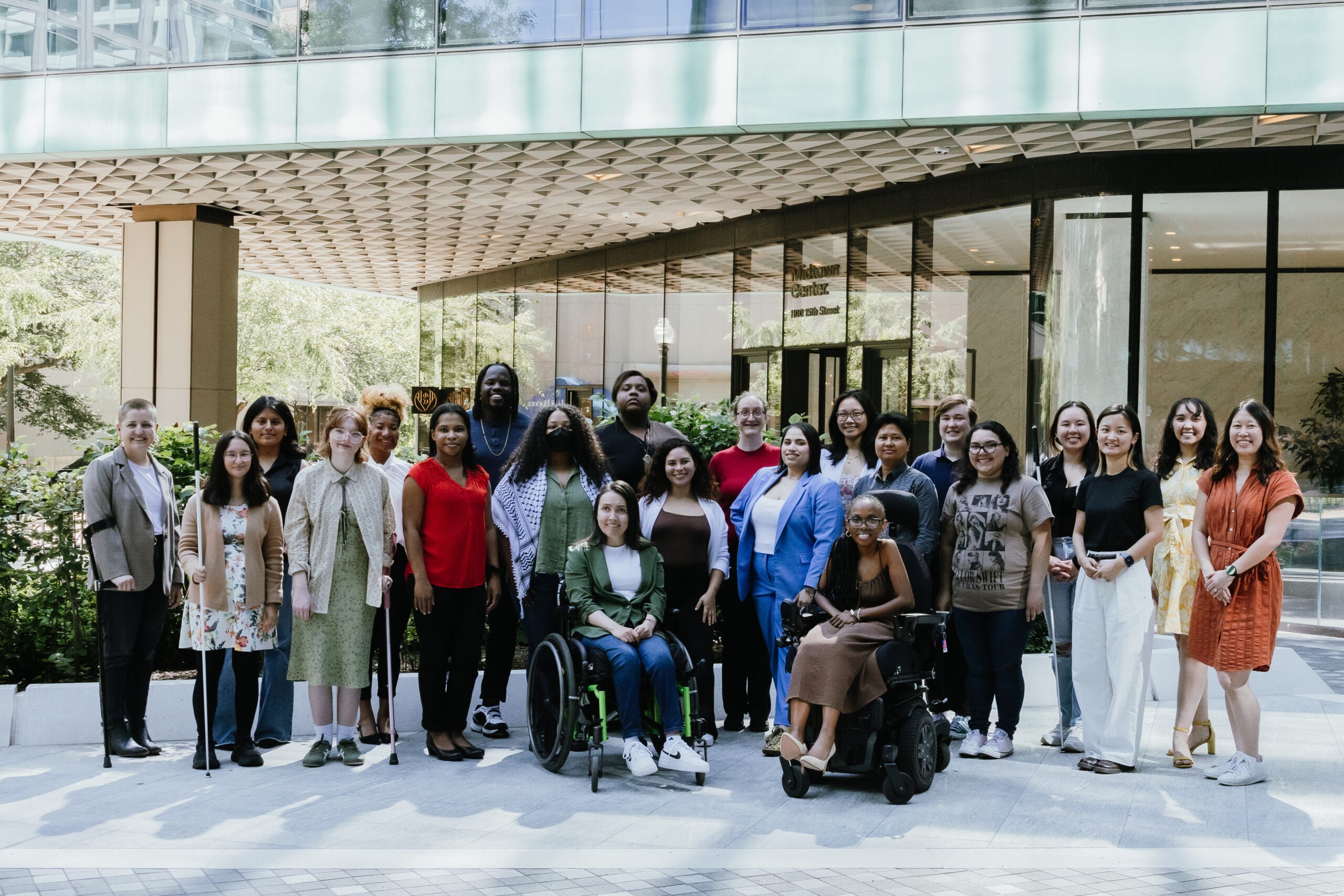Disability Advocacy Certificate Program
To complement the internship program, AAPD interns participate in the Disability Advocacy Certificate Program. They gain knowledge and strategies to advocate for the disability community in their school, home state, and nationally.

The AAPD Disability Advocacy Certificate Program was established in 2018 for participants of the Summer Internship Program.
During the Summer, interns complete their internships Monday to Thursday and participate in a Disability Advocacy Certificate Program course weekly on Fridays for four (4) hours. During the fall, interns participate in the certificate program bi-weekly for 3 hours. The Disability Advocacy Certificate Program is only available as a program for participants in AAPD’s Internship Program.
The Certificate Program prepares participants to be knowledgeable and effective advocates for the disability community. The focus is on preparing interns to use their own story to advocate in their own community, university, state, and on the national level. Through discussions with experts, interns will learn to apply their strengths and skills to advocate effectively to influence change. Interns will become familiar with the history of the disability community and its impact on the present day.
Photo by Jeevan Portraits.
The AAPD Disability Advocacy Certificate Program is currently only available for people who are participating in the AAPD Summer Internship Program. Interns that participate in the Disability Advocacy Certificate Program will be able to:
Identify a variety of advocacy strategies and tactics to address issues the disability community faces
Communicate their story on issues across multiple mediums
Describe approaches to developing relationships and coalitions.
Apply an intersectional lens to their advocacy.
Understand their role and responsibility in the collective disability rights movement.
2024 Course Topics
- Introduction to Organizing, Advocacy, and Policy
- How to Tell Your Story
- Levels of Advocacy: Individual & Self Advocacy
- Levels of Advocacy: Systems Advocacy
- Exploring Different Tactics: Direct Action, Legal, Legislative, Administrative
- Exploring Different Tactics: Media/Education, Digital, Artistic, and Mutual Aid
Coalition and Power Building
Past Disability Advocacy Certificate Program Speakers
We are so grateful to invite disability leaders as presenters and panelists during the Disability Advocacy Certificate Program. Some past speakers include:
- Mia Ives-Rublee, Center for American Progress- Disability Justice Initiative
- Elijah Armstrong, Equal Opportunity Students
- Britney Wilson, NYU Civil Rights and Disability Justice Clinic
- Anita Cameron, Disability Rights Advocate
- Rasheera Dopson, Inclusive Excellence and Diversity Fellow at the Institute for Human Development at Northern Arizona University
- Teresa Nguyen, Lurie Institute for Disability Policy
- Ricardo Thornton, DC Developmental Disabilities Council
- Jules Good, Founder and Consulting Lead at Neighborhood Access
- Rachel Litchman, Cartoonist, Writer, and Consultant
- Blessit Shawn Bryant, Social Justice Advocate, Digital Strategist, and Style Expert
- And many more…
Disability Advocacy Certificate Program Assignments
During the Certificate Program, AAPD interns will complete several assignments to apply and process what they learned with an emphasis on advocacy through storytelling. Past assignments have included storytelling in practice, policy memos, and the final group advocacy project.
One-Pager Handout/Policy Memo
Interns apply their learning about policy advocacy through storytelling and communication by writing a policy memo on an issue or legislation of their choice. It is an opportunity to practice a clear and concise way to convey their research and information about a particular issue or legislation to their elected official.
Final Projects
For their final project, interns collaborate in groups on advocacy plans to address an issue impacting the disability community. The advocacy plans include the history of the issue, action steps, materials related to their action steps, and a launch plan. During the last week of class, the intern groups present their plans to a wide audience including AAPD staff and Board Members, sponsors, mentors, and internship supervisors.
Storytelling in Practice
As part of the Disability Advocacy Certificate Program, interns practiced using storytelling frameworks for advocacy. Interns developed their stories in a compelling and creative way using various digital media formats.. These stories highlight the AAPD intern’s personal experience while advocating for a cause that they are passionate about.
AAPD may share your response on AAPD’s social media and/or website. A few examples of past intern’s work include:
